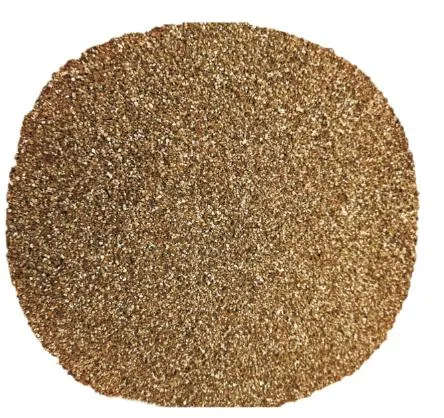Jul . 28, 2025 16:56 Ku laabo liiska
Boosted by Advanced Iron Powder and Carbon Additive Solutions
In industrial metallurgy and casting sectors, precision, purity, and performance define success. Materials such as iron powder, carbon additives, and recarburizers play pivotal roles in achieving the desired strength, structural consistency, and thermal performance in manufactured components. As industries shift towards higher standards and tighter tolerances, the demand for high-quality base materials sourced from trusted manufacturers becomes increasingly critical. Whether it's metal injection molding, casting, or powder metallurgy, choosing the right combination of iron and carbon-based materials is the cornerstone of a reliable production process.

Demand for Efficiency Drives Growth for Recarburizer Manufacturer in Global Foundries
Modern foundries require consistent input materials to ensure optimal casting results. In this context, the expertise of a recarburizer manufacturer becomes indispensable. Positioned at the core of cast iron and steel production, recarburizers are added to adjust carbon content in molten metal, compensating for losses that occur during melting. A professional recarburizer manufacturer ensures product granularity, purity, and combustion efficiency that meets industrial-grade specifications. These qualities are particularly crucial in automotive part manufacturing, rail industries, and heavy machinery where microstructure directly impacts durability.
Enhancing Casting Integrity with Carbon Additive for Casting in Steel and Iron Foundries
Industrial-grade carbon additive for casting is engineered to optimize the carbon recovery rate in molten baths. These additives typically feature high fixed carbon content with minimal sulfur and nitrogen, enabling superior diffusion and absorption in casting processes. A properly selected carbon additive for casting ensures uniform distribution in the molten mixture, enhancing mechanical strength and structural refinement. This is especially vital for large-scale industrial components where any deviation in composition can lead to internal stress or brittleness under operational loads.
Diverse Applications Reinforce the Significance of Iron Powder in Industrial Processes
The versatility of iron powder makes it a staple in numerous industrial operations, from powder metallurgy to magnetic core production and automotive parts. Blended into component formulations, iron powder enables precision molding and sintering techniques that yield lightweight, high-strength products. Its adaptability to complex shapes and ability to maintain dimensional accuracy without extensive machining reduces production costs while elevating consistency. In addition to its role in metallurgy, it serves critical functions in chemical reactions, soft magnetic materials, and even environmental treatment technologies.
Industrial Cleaning and Water Treatment Benefit from Targeted Use of Iron Out Powder
Though originally developed for household applications, iron out powder has found significant relevance in industrial-scale operations. In facilities dealing with high iron content in water systems or on machinery surfaces, this compound efficiently eliminates rust, scale, and mineral deposits. When applied under controlled conditions, iron out powder minimizes maintenance downtime and prolongs the life of boilers, pipelines, and heat exchangers. Its non-abrasive action is especially valued in settings where preserving surface integrity is essential for performance and compliance.
Iron Powder Metallurgy Elevates Modern Manufacturing Across High-Precision Sectors
Advancements in iron powder metallurgy have revolutionized the manufacture of high-precision, high-strength components. By compressing iron powder into desired forms and sintering them at high temperatures, manufacturers produce parts that exhibit remarkable structural density and resilience. This technique is now widely applied in automotive gears, industrial tools, and energy-efficient appliances. The controlled porosity offered by iron powder metallurgy also allows for enhanced lubrication retention and weight optimization, making it ideal for industries focused on reducing environmental impact and maximizing fuel efficiency.
The Role of Material Purity in Recarburizer Efficiency
The effectiveness of a recarburizer is highly dependent on its purity level. High-purity materials provide faster absorption in molten metals, reduce slag formation, and result in fewer inclusions in the final product—critical for performance-grade steel production.
Why Powder Form Enhances Performance in Iron-Based Manufacturing
Iron powder provides a larger surface area-to-volume ratio compared to solid metals. This property enhances reaction rates, melting behavior, and alloying accuracy, which are essential in industries where batch quality consistency is non-negotiable.
Carbon Additive Behavior Under High-Temperature Conditions
In high-temperature furnaces, carbon additives must maintain structural integrity long enough to release carbon efficiently. Additives designed for industrial use exhibit stable combustion and effective dispersion, preventing uneven carbon distribution in molten alloys.
Iron Powder and Additive Materials FAQs
Q: How does a reliable recarburizer manufacturer impact product quality in steel plants?
A: A certified recarburizer manufacturer ensures consistency in fixed carbon levels, ash content, and particle size, all of which are vital for reducing rework and maintaining the structural integrity of steel and cast iron products.
Q: What properties should I look for in a carbon additive for casting?
A: Look for high fixed carbon content (above 98%), low sulfur (<0.05%), and high absorption rates. A well-designed carbon additive for casting improves carbon recovery efficiency and supports even alloy formation.
Q: Where is iron powder most commonly used in industrial applications?
A: Iron powder is extensively used in sintered parts, magnetic cores, soft magnetic composites, chemical catalysts, and as a reductant in metallurgy and water treatment.
Q: What industrial processes benefit from iron out powder usage?
A: Large-scale water treatment systems, food processing equipment, and HVAC facilities use iron out powder to remove iron-based stains and maintain operational hygiene.
Q: How does iron powder metallurgy contribute to sustainability goals?
A: Iron powder metallurgy minimizes material waste, reduces machining needs, and enables energy-efficient part manufacturing—all of which align with modern sustainability standards.
-
Strength with Premium Steel and Calcined Bauxite
WararkaJul.28,2025
-
Revolutionize Construction Efficiency with Smart Industrial Materials
WararkaJul.28,2025
-
Redefined with High-Grade Iron Powder Solutions
WararkaJul.28,2025
-
Metallurgical Efficiency with Innovative Recarburisers and Covering Agents
WararkaJul.28,2025
-
Industrial Efficiency Enhanced with High-Performance Recarburizer Solutions
WararkaJul.28,2025
-
Boosted by Advanced Iron Powder and Carbon Additive Solutions
WararkaJul.28,2025
